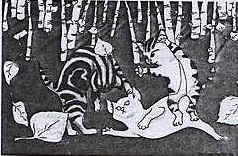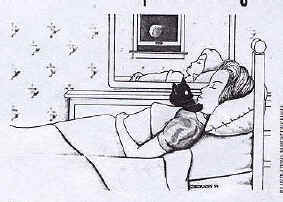Relating the story of the birth of Jesus Christ in a cave, the
Gospel of the Holy Twelve says :
" And there were in the same cave an ox and a horse and an
ass, and a sheep, and beneath the manger was a cat with her little
ones, and there were doves also, overhead, and each had its mate
after its kind, the male with the female. Thus it came to pass
that he was born in the midst of the animals which, through the
redemption of man from ignorance and selfishness, he came to
redeem from their sufferings, by the manifestation of the sons
and the daughters of God."
The love of the Master for the animals who had shared His
birth-chamber is beautifully portrayed in the following legend:
" As Jesus passed through a certain village He saw a crowd of
idlers of the baser sort, and they were tormenting a cat which
they had found, and shamefully treating it. And Jesus commanded
them to desist and began to reason with them, but they
would have none of His words, and reviled Him. Then He made
a whip of knotted cords and drove them away, saying. This earth,
which my Father-Mother made for joy and gladness, ye have
made into the lowest hell with your deeds of violence and cruelty.
And they fled before His face. But one more vile than the rest
returned and defied Him. And Jesus put forth His hand, and the
young man's arm withered, and great fear came upon all; and
one said, He is a sorcerer. And the next day the mother of the
young man came unto Jesus, praying that He would restore the
withered arm. And Jesus spake unto them of the law of love,
and the unity of all life in the one family of God. And He also said,
As ye do in this life to your fellow-creatures, so will it be done to
you in the life to come. And the young man believed and confessed
his sins, and Jesus stretched forth His hand, and his
withered arm became whole even as the other. And the people
glorified God who had given such power to man " (xxiv. 1-5).
Reading on, we again find Christ protecting an unhappy cat,
comforting her loneliness, and providing lovingly for her future.
" As Jesus entered a certain village He saw a young cat which
had none to care for her, and she was hungry and cried unto Him;
and He took her up, and put her inside His garment, and she lay
in His bosom. And when He came into the village He set food
and drink before the cat, and she ate and drank, and showed
thanks unto Him. And He gave her unto one of His disciples
who was a widow, whose name was Lorenza, and she took care of
her. And some of the people said, This man careth for all
creatures . . . are they His brothers and sisters that He should
love them ? And He said unto them. Verily these are your
fellow-creatures, of the great Household of God; yea, they are
your brethren and sisters, having the same breath of life in the
Eternal. And whosoever careth for one of the least of these,
and giveth it to eat and drink in its need, the same doeth it unto
Me ; and whoso willingly suffereth one of these to be in want, and
defendeth it not when evilly entreated, suffereth the evil as done
unto me; for as ye have done in this life, so shall it be done
unto you in the life to come " (xxxiv. 7-10).
For the second time in connection with the Cat, the solemn
warning is uttered by the Master that all creatures are so closely
knitted to Him that our every action towards them is counted
as if done unto Himself.
The legends are not unduly overlaid with miracle, but describe
events we need feel no great difficulty in crediting, and in the
simple narration seem to bear the stamp of truth. Christ, having
spent a part of his childhood in Egypt, may easily be supposed
to have felt a special sympathy for the sacred symbol of his own
prototype, Osiris-Horus, and to have been shocked at the spectacle
of his countrymen ill-treating the animal he was accustomed to see
regarded with so much reverence.
" The Gospel of the Holy Twelve." Written down and pub. by the late
Rev. G. J. Ouseley. New edition pub. by Edson, Ltd., London, 1923
|
 their cat door, the ghost followed-through the
closed door. After about two years, the ghost cat
stopped appearing. The woman hoped it had found
rest or had been reborn to experience life fully.
their cat door, the ghost followed-through the
closed door. After about two years, the ghost cat
stopped appearing. The woman hoped it had found
rest or had been reborn to experience life fully.